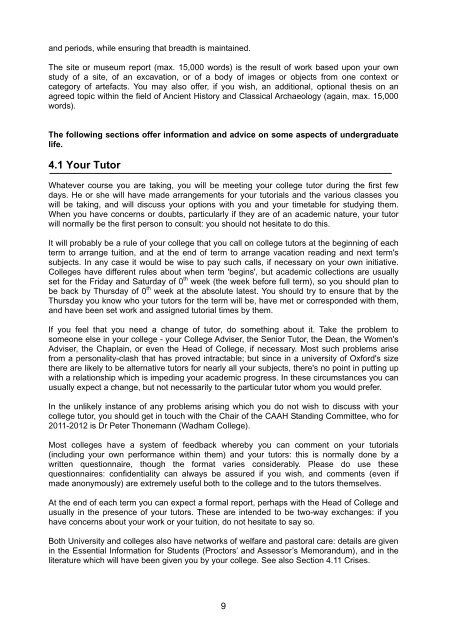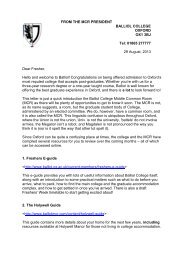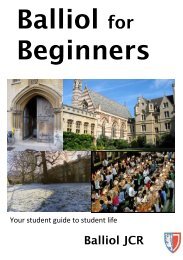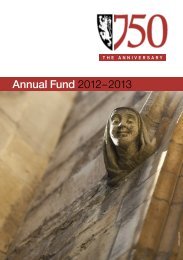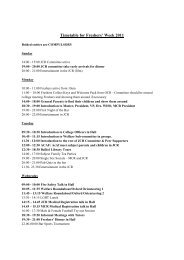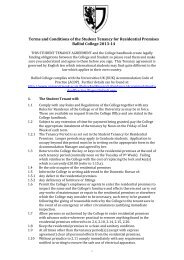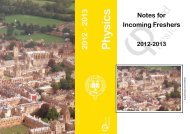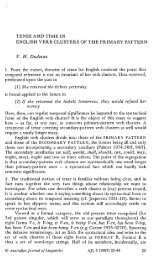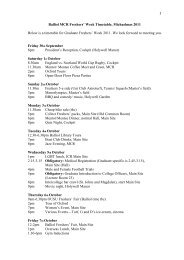CAAH Mods 2011 - Balliol College - University of Oxford
CAAH Mods 2011 - Balliol College - University of Oxford
CAAH Mods 2011 - Balliol College - University of Oxford
You also want an ePaper? Increase the reach of your titles
YUMPU automatically turns print PDFs into web optimized ePapers that Google loves.
and periods, while ensuring that breadth is maintained.<br />
The site or museum report (max. 15,000 words) is the result <strong>of</strong> work based upon your own<br />
study <strong>of</strong> a site, <strong>of</strong> an excavation, or <strong>of</strong> a body <strong>of</strong> images or objects from one context or<br />
category <strong>of</strong> artefacts. You may also <strong>of</strong>fer, if you wish, an additional, optional thesis on an<br />
agreed topic within the field <strong>of</strong> Ancient History and Classical Archaeology (again, max. 15,000<br />
words).<br />
The following sections <strong>of</strong>fer information and advice on some aspects <strong>of</strong> undergraduate<br />
life.<br />
4.1 Your Tutor<br />
Whatever course you are taking, you will be meeting your college tutor during the first few<br />
days. He or she will have made arrangements for your tutorials and the various classes you<br />
will be taking, and will discuss your options with you and your timetable for studying them.<br />
When you have concerns or doubts, particularly if they are <strong>of</strong> an academic nature, your tutor<br />
will normally be the first person to consult: you should not hesitate to do this.<br />
It will probably be a rule <strong>of</strong> your college that you call on college tutors at the beginning <strong>of</strong> each<br />
term to arrange tuition, and at the end <strong>of</strong> term to arrange vacation reading and next term's<br />
subjects. In any case it would be wise to pay such calls, if necessary on your own initiative.<br />
<strong>College</strong>s have different rules about when term 'begins', but academic collections are usually<br />
set for the Friday and Saturday <strong>of</strong> 0 th week (the week before full term), so you should plan to<br />
be back by Thursday <strong>of</strong> 0 th week at the absolute latest. You should try to ensure that by the<br />
Thursday you know who your tutors for the term will be, have met or corresponded with them,<br />
and have been set work and assigned tutorial times by them.<br />
If you feel that you need a change <strong>of</strong> tutor, do something about it. Take the problem to<br />
someone else in your college - your <strong>College</strong> Adviser, the Senior Tutor, the Dean, the Women's<br />
Adviser, the Chaplain, or even the Head <strong>of</strong> <strong>College</strong>, if necessary. Most such problems arise<br />
from a personality-clash that has proved intractable; but since in a university <strong>of</strong> <strong>Oxford</strong>'s size<br />
there are likely to be alternative tutors for nearly all your subjects, there's no point in putting up<br />
with a relationship which is impeding your academic progress. In these circumstances you can<br />
usually expect a change, but not necessarily to the particular tutor whom you would prefer.<br />
In the unlikely instance <strong>of</strong> any problems arising which you do not wish to discuss with your<br />
college tutor, you should get in touch with the Chair <strong>of</strong> the <strong>CAAH</strong> Standing Committee, who for<br />
<strong>2011</strong>-2012 is Dr Peter Thonemann (Wadham <strong>College</strong>).<br />
Most colleges have a system <strong>of</strong> feedback whereby you can comment on your tutorials<br />
(including your own performance within them) and your tutors: this is normally done by a<br />
written questionnaire, though the format varies considerably. Please do use these<br />
questionnaires: confidentiality can always be assured if you wish, and comments (even if<br />
made anonymously) are extremely useful both to the college and to the tutors themselves.<br />
At the end <strong>of</strong> each term you can expect a formal report, perhaps with the Head <strong>of</strong> <strong>College</strong> and<br />
usually in the presence <strong>of</strong> your tutors. These are intended to be two-way exchanges: if you<br />
have concerns about your work or your tuition, do not hesitate to say so.<br />
Both <strong>University</strong> and colleges also have networks <strong>of</strong> welfare and pastoral care: details are given<br />
in the Essential Information for Students (Proctors’ and Assessor’s Memorandum), and in the<br />
literature which will have been given you by your college. See also Section 4.11 Crises.<br />
9


